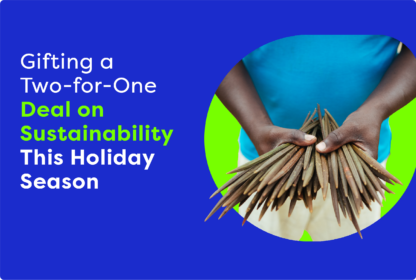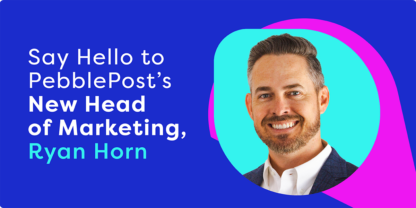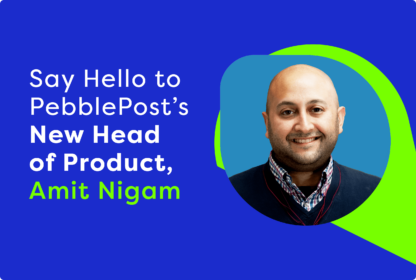It’s that time of year again—time to honor some incredible female leaders at PebblePost in honor of Women’s History Month.
We know that the U.S. and the world generally have a long way to go until women are treated equally, especially in business. However, PebblePost is taking steps in the right direction to close this gap.
We’re proud that our company is more than half female, with 33.33% represented in our C-suite. That’s more than the average for corporate America and Canada, according to McKinsey & Company and LeanIn.org research, which found that women make up 28% of the C-Suite across 276 participating organizations employing more than 10 million people. It’s also more than all major tech companies except for Meta, which is just 0.67% higher at 34% females in the C-Suite. We also have:
- 100% female representation in Marketing
- 66.67% female representation in Revenue, with our Sales and Brand Partnerships teams at 50% and 90% female, respectively
- 26.32% female representation in Technology, with our Data Science and Engineering teams at 25% and 26.67 female, respectively
The numbers speak for themselves, but direct lived experience speaks louder. So, we sat down with some of PebblePost’s female leaders to hear about their career trajectories, taking risks, and advice for up-and-comers.
Interviewees:
Mariya Post (MP): Vice President of Business Operations
Brittany Wolf (BW): Chief Operating Officer
Allison Borrow (AB): Director of Revenue Marketing
Melissa Racklin (MR): Regional Vice President of Sales
Hannah Ohlson (HO): Director of Analytics & Insights
Shannon Stone (SS): Vice President of Brand Partnerships
MP: I am by nature quite direct and assertive—qualities that are seen as positive when possessed by a male, but as a woman, these qualities are seen as bossy, too much, or ruffling feathers. Many times, I have been the only woman at a meeting. I used to be more apologetic for my style, and I’ve learned over time to preface some of my comments as ‘I’m going to play some devil’s advocate now,’ but a big lesson here is to not apologize for who I am and instead embrace it. My direct and challenging nature enables faster decision-making and considerations from different angles—both positives leading to innovation and action. And, yes, sometimes I do ruffle feathers :).
How did you get started in the marketing technology industry? What led you to PebblePost?
AB: My journey in the marketing technology industry as a marketing professional started at MediaMath, a DSP. I spent my early career years working as an event planner at a venue in NYC, where I learned how to conduct well-orchestrated events to drive demand-generation efforts. After experiencing a deep desire to hone my marketing skills, I learned about MediaMath from a college friend and joined during an exciting time in the digital marketing industry. Everyone wanted to be a part of the disruption breaking down Walled Gardens, and programmatic was a buzzword that was just being defined.
At PebblePost, I was drawn by our passionate team and our commitment to helping brand marketers effectively reach audiences. Having experienced this challenge firsthand when working on the brand side, I’m deeply invested in the solutions we provide and get to have fun with the people I work with every day!
How do you balance ambition and authenticity in your leadership style, and what advice would you give to other women striving to find their authentic voice in business spaces or corporate settings that tend to be male-dominated?
MR: I’m constantly searching to evolve and be the best version of myself. Showing up as an authentic leader is important. I focus on letting go of striving for perfection and needing to have all of the right answers. I’ve learned that it’s okay to lean into softer skills, even in a male-dominated workplace.
It’s difficult sometimes for women to be the leaders they truly want to be, with fear of being ‘weak’ or ‘emotional’ in a male-dominated organization. I believe striving to ‘have a seat at the table’ as a woman in business is best. Take on new projects, and find your inner voice to give you the confidence to push yourself outside your comfort zone. I have seen a positive movement toward a softer, more authentic leadership style than what was valued earlier in my career.
HO: Speaking in broadly gendered terms, I think the advice to women leaders is often to act more ‘traditionally masculine’ in their mannerisms to be taken seriously. In actuality, that would often require sacrificing personality strengths that have served you personally well, which would be a more beneficial attribute to have as a whole in the upper echelons of business.
Collaboration, sharing success, and being open to other points of view—none are concepts people tend to align closely with the stereotypical male business leader, but that doesn’t mean they’re characteristics that should be suppressed to succeed. It’s not easy to strike the right balance—when openness to being wrong turns into indecisiveness, for example—but it’s a far more worthwhile exercise to constantly check in and navigate that collaborative path than attempting to affirm the status quo.
How do you approach the concept of failure, and what advice would you offer anyone who fears taking risks in their careers?
AB: As a natural perfectionist, adjusting to life without a fool-proof plan wasn’t easy. Over time, I’ve learned that fear often arises from a sense of loss of control or regret. Despite facing significant changes, such as relocating independently and shifting career paths, I’ve embraced the power of reframing. Rather than fearing failure, I see it as an experiment guiding me toward the right outcome, much like scientists testing hypotheses.
As Seth Godin puts it, ‘Failure is simply a cost you must pay on the way to being right.’ Trust your instincts when deciding which risks and failures are worth experimenting with, and practice self-compassion. Just because an outcome from that risk you took isn’t immediate, it doesn’t mean you’re not on the right path.
There’s a saying I’ve always found useful: ‘Fear is like fire. It can warm your home or burn your house down.’ A healthy level of fear can motivate you to push beyond your comfort zone, take calculated risks, and explore new opportunities. If you are too comfortable, you probably need to grow. I really believe that. Once you shift to that mindset, you’ll start to seek ‘riskier’ opportunities that put you outside of your comfort zone professionally.
Brittany Wolf – COO, PebblePost
MR: I love the saying, ‘Life is happening for us, not to us.’ For any of us to learn and grow, we must take risks and go outside of our comfort zone. It’s human nature to feel insecure or fearful of taking a risk in fear of failure. Failure is part of life. If you haven’t failed, you haven’t pushed yourself hard enough. Ask yourself what you really want in life; don’t settle for something less than you’re capable of. Fear is real, but the desire should be something you go for. Push through fear, and you will be on the other side of something far greater. On the other side of fear is everything you want. Go for it, and don’t have regrets.
Have mentorship and networking been important for you in advancing your career, and if so, how? Can you speak to any one piece of advice you’ve been given that has stuck with you?
HO: When people think of networking, they often think of superficial, tit-for-tat conversation and disingenuous interest. But there is no set checklist you need to follow to network effectively. Not everyone will enjoy making the rounds at conferences or having weekly coffee meet-ups, which doesn’t make them less effective at building out their professional community.
At its core, networking and mentorship should be about a genuine connection. Rather than ‘positioning’ yourself, it helps to focus on what you find genuinely interesting about someone. You already have one thing in common (your job field), so being open to additional connections or areas of commonality can help form an authentic and enjoyable professional relationship. Doing good work, being friendly and approachable, and seeking professional opportunities that interest you are forms of slow-burn networking and can help build a strong professional reputation.
MP: Mentorship and especially sponsorship have been crucial in my career and professional growth. I have been very fortunate to have managers and mentors advocate for me. Two specific examples come to mind:
- I had uncovered an opportunity to pivot from account management to sales operations and better support the company I was working for at the time. I had softly asked my manager for his input, and he didn’t react much. The next day, I had dinner with a mentor, and she told me I would go back to him and gave me a script. I followed her advice and, within a week, was pitching sales ops to the CEO and, later that month, building out this new department. This was a risk, of course, but one that has paid major dividends and set me on my current career path.
- A completely unrelated example: After a leadership meeting, I shared a perspective with my manager about something outside my ‘swim lane.’ It was a really important moment as her feedback to me then turned around how I approach all conversations I am in—it’s almost like she gave me ‘permission’ to show up and call out how I see it unapologetically: ‘You are in that room because you have valuable inputs across the whole business. Do not be limited to your department/expertise—share all your points of view.’
How do you prioritize self-care and maintain resilience in the face of adversity or setbacks in your business endeavors?
BW: I try to consciously maintain a positive mindset and perspective, recognizing that setbacks are an inevitable part of any journey. Those setbacks or failures are often an opportunity to learn and inform what comes next. The people you surround yourself with have an impact, too. I try to seek guidance from those who are really good at adapting to change and creative problem-solving.
SS: I must confess that I have struggled with prioritizing self-care. I have experienced feelings of guilt that have prevented me from taking care of myself with the same zeal as my job. Interestingly enough, adversity and setbacks have taught me how to listen to my body, brain, and wellness. I have learned that I am better and stronger with a good and healthy lifestyle.
The PebblePost Values are: “We Own It,” “We Win Together,” “We Are Agile,” “We Are Data-Driven,” and “We Value Authenticity.” Which of these resonates with you most and why?
SS: ‘We Value Authenticity’ resonates because we are nothing if not good human beings first. Being authentic manifests in real people, real conversations, and real outcomes. Because if we are authentic, we will win together.



